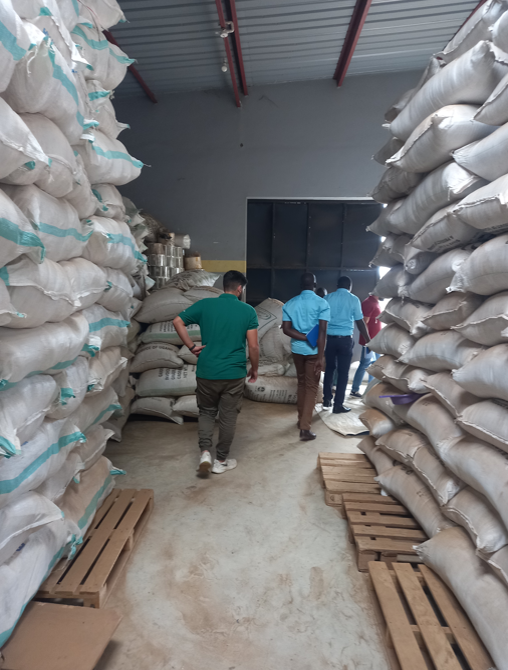Learners in fear over food-related illnesses

One of the recommended storage facilities by Uganda National Bureau of Standards to prevent contamination of food at schools. PHOTO | FRED WAMBEDE
What you need to know:
- A section of students interviewed from different schools acknowledged suffering stomach-related problems, including nausea, vomiting and diarrhoea at least twice in a term, especially after meals.
Cases of foodborne illnesses among pupils and students in schools are rampant, causing anxiety among learners, The Monitor has established.
This is attributed to either eating contaminated, expired foods or other related beverages. These foods are also contaminated by infectious or noninfectious agents such as bacteria.
The week-long investigations carried out by this publication show that the rise is due to most schools feeding learners on poor quality foods and products, which are not certified, in addition to lacking good storage facilities.
A section of students interviewed from different schools acknowledged suffering stomach-related problems, including nausea, vomiting and diarrhoea at least twice in a term, especially after meals.
Mr Denis Odur, the market surveillance officer at Uganda National Bureau of Standards (UNBS), said the unwanted substances such as stones, insects, pesticides, metals, fungi, and bacteria, among others in the food, leads to foodborne illness and injuries.
“Contaminated food can make learners and all of us ill, cause injuries and sometimes death,” Mr Odur said on Monday.
Mr Odur said high moisture grains in poor storage facilities lead to aflatoxins and insect infestation thus food contamination.
In July, about 150 students of Nakanyonyi Secondary School in Mukono District were hospitalised as a result of suspected food contamination. In March 2019, there was also food contamination in Amudat District.
Between April and May, UNBS impounded about 100 tonnes of Covid-19 relief food, which they found to be contaminated. Between May and June 2023, South Sudan Bureau of Standards also impounded more than 90 trucks of maize grain and flour from Uganda because of aflatoxin contamination.
Agnes (not her real name), a senior five student and dinning prefect at one of schools in Mbale District, said cases of food poisoning are rampant.
“For instance, during the first week of this term, most of my colleagues complained of stomach ache after they had supper. We later learnt that it was due to spoilt maize flour,” she said.
Mr Charles Nangerah, the head teacher of Tunyi Girls Secondary School in Bulambuli District, blamed the problem of contaminated food to failure by UNBS to enforce compulsory standards among the manufactures in the supply chain.
“UNBS should ensure that products placed in the market meet the standards so as to minimize chances of buying poor quality beans and other products,” Mr Nangerah said.
Mr Nangerah made the remarks during a workshop on the awareness of quality standards of maize, rice and sorghum within the Elgon Sub-region, which took place at Mbale Resort Hotel at the weekend.
Mr Nangerah added that suppliers send to the market expired products, something he said risks the lives of learners and the public.
“Some manufacturers practice deception by under-declaring weights, volumes and also false nutritional claims,” he said.
Mr Simon Peter Mwalye, the head teacher of Jack and Jill Primary School in Mbale District, urged UNBS to strengthen measures to prevent smuggling of sub-standard goods from neighbouring countries.
“They should prevent dumping of sub-standard products on the market, which we also fall prey to and buy,” he said.
Mr Henry Wakooli, a health worker in Mbale, said foodborne illness may in the long run cause physical discomfort and pain to the victims.
“The long term health implications of eating contaminated foods include kidney failure and liver complications. To the learners, it impacts negatively on the academic performance,” he said.
According to UNBS, about 600 million cases of foodborne illness are registered per year globally and 420,000 people die every year as a result of eating contaminated food.
Mr Wakooli said it is pertinent for schools across the country to ensure that safe and quality food is provided to learners.
“The schools should purchase certified products and ensure that shelf life of the foods are checked and monitored,” he said.
Mr Moses Odeke, the director of Link Child Nursery and Primary School in Mbale City, said the threat of contaminated food in schools is a ticking time bomb.
“The shops in the villages are selling expired products such as soda, bread and maize flour but nobody cares. People are shortening their lives due to expired products,” he said.
Mr Joseph Lutaaya, the senior certification officer at UNBS, said children below the age of 5 carry 40 percent of the food illness burden.
He said UNBS operates a Product Certification Scheme Under which manufacturers apply for and are granted permits.
“The UNBS certification mark is a symbol of quality. It demonstrates that a product meets the required standards and safe for consumption or use,” he said.
He added: “Schools should also ensure good personal hygiene practices and management of food. Stores should be clean and rodent proof,” he said.
He further said schools that mill their maize should be certified by UNBS to ensure flour is packaged well.




